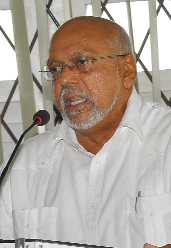President Donald Ramotar yesterday issued a notice proclaiming January 25, 2012 as the date for the election of members of the 10 Regional Democratic Councils (RDCs) to be held.
The notice of the proclamation, in accordance with Article 73 (2) of the Constitution, was released by the Government Information Agency yesterday and paves the way for a series of elections which will test the three parties on alliance building.

With the Guyana Elections Commission (GECOM) completing the gazetting of the 2011 general and regional elections results and the convening of the National Assembly, GECOM spokesman Vishnu Persaud said that the body wrote the President on the convening of the RDCs. He explained that the GECOM gazetted the list of persons named to serve in the National Assembly and in the Regional Democratic Councils. The Regional Executive Officer (REO) of each of the regions will have to put the necessary arrangements in place for the elections of Chairman and Vice Chairperson of the Councils. Persaud said that for this purpose, the REO will act as Returning Officer in their respective region.
Region Eight (Potaro/Siparuni) is the only region where last year’s elections did not produce a majority result. The AFC gained a plurality – the single highest number of seats. However, while winning the region and the parliamentary seat that went with it, the AFC would require support from APNU or the PPP/C to secure the position of chairman of the region when the Regional Democratic Council holds its elections.
The results for the regional elections show that of the 15 council seats, the AFC won 6, APNU 4, the PPP/C 4 and TUF 1. Therefore to secure the position of chairman the AFC would require the support of one party or its en-bloc abstention.
The convention usually is that the party with the highest number of seats would gain support for the chairmanship. Having finally concluded a deal on the Speaker and Deputy Speaker of the National Assembly, observers say that the atmosphere is now more propitious for an arrangement between the AFC and APNU.
Sources suggest that neither the AFC nor APNU would want the PPP/C to control the region – increasingly important as swing votes – and would work out a deal.
Asked at a recent press conference whether the AFC has been talking with APNU on the Region Eight Council, Ramjattan said that he has not spoken to any high representatives of APNU in relation to this. “But because of the fact that it came out four for APNU, four for PPP and six for AFC, we are hoping that we will get the chairmanship and one of the other parties which supported our candidate for the chairmanship will get the vice-chairmanship,” he said.
‘Regional agenda’
Ramjattan added that regarding the regional seats, the AFC has not had talks with the PPP/C or with APNU but said that his party is open to dealing with both. He said that depending on what the parties will have as a regional agenda, AFC would be willing to support either APNU or PPP.
In the other nine regions there is a clear majority. Region Seven (Cuyuni/Mazaruni) has the slenderest and will test the parties to ensure that their members are present for key votes. APNU has eight seats while the PPP/C has six and the AFC has one.
Whereas it had a broader majority in Region 5 (Mahaica/West Berbice) in 2006, the PPP/C has a two-seat majority in 2011. It has 10 seats while APNU has six and the AFC, 2. Region 9 (Upper Takutu/Upper Essequibo) can also be tricky. The PPP/C has eight of 15 seats. APNU has 4, the AFC 2 and TUF 1.
In 2006, the most watched regional council election was in Region Four where for the first time since 1992, the PNCR did not have a clear majority.
It held 16 seats, the PPP/C 15 seats, the AFC three seats and the Justice For All Party one seat.
There had been intense speculation that one of the two major parties would do a deal with the AFC for the chairmanship. However, when the election was held, the PNCR combined with the PPP/C to secure the chairmanship. Co-operation between the two parties fell away rapidly after that and there were several acrimonious meetings and bitter exchanges between councillors on both sides.




